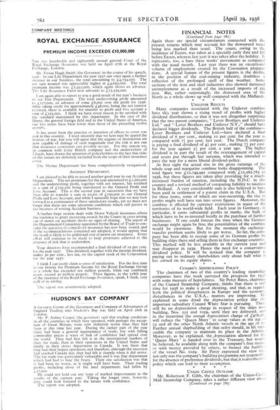UNILEVER RESULTS
Many companies associated with the Unilever combine have this year shown a rising trend of profits with higher dividend distributions, so that it was not altogether surprising that the two parent companies, "Lever Brothers and Unilever Ltd." and "Lever Brothers and Unilever N.V.," should have declared bigger dividends. The British half of the combine— Lever Brothers and Unilever Ltd.—have declared a final dividend of 6 per cent., making to per cent. for the year as compared with 7} per cent. last year. The Dutch company is paying a final dividend of 41 per cent., making 7i per cent. for the year against 51 per cent, a year ago. The higher dividend is in part the result of the rearrangement of capital and assets put through last autumn, which was intended to pave the way for a more liberal dividend-policy.
At first sight the actual rise in the gross earnings of the whole soap and margarine combine looks disappointing. The total figure was £12,749,991 compared with £12,562,783 in 1936, but these figures are taken after providing for a much- increased burden of taxation, including the N.D.C. in this country and a revised method of computing liability to taxation in Holland. A very considerable sum is also believed to have been paid in settlement of a patent claim in the U.S.A. But for these items, some of which are non-recurring, the rise in profits might well have run into seven figures. Moreover, the combine is affected by currency restrictions in many of the territories of its world-wide field. Each year in Germany, in particular, it earns substantial profits in marks, the bulk of which have to be re-invested locally in the purchase of further businesses. If one could foresee the time when the German exchange might again be free, the potentialities of the combine would be enormous. But for the moment the exchange- transfer problem seems likely to get worse. So far, the com- pany has been able to recoup some of its German profits by building ships there and selling them in free exchange countries. This method will be less available in the current year and may disappear in 1939. Hence the need for a conservative dividend policy. It will be noticed that the company is paying out to ordinary shareholders only about half what it has earned on its equity shares.
* *


























































 Previous page
Previous page